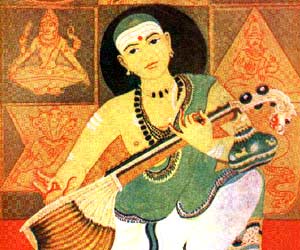Carnatic music exponent Muthuswami Dikshitar made
500 compositions that are sung even today. Here's a biography on his
life history.
Muthuswami Dikshitar

Born - 1775
Died - 1835
Achievements - Muthuswami Dikshitar was an exponent of the South
Indian Carnatic music genre. He created about 500 compositions in total,
most of which are widely sung by renowned musicians in Carnatic music
performances even today.
Born in the year 1775 as the eldest son of Ramaswami Dikshitar and
Subbamma at Tiruvarur in the Tamil Nadu state, Muthuswami Dikshitar
happens to be the youngest of the Carnatic music composer trinity. It is
said that Muthuswami Dikshitar was born to his parents after the couple
prayed for a child in the Vaitheeswaran Koil temple. Read this biography
to learn more about the famous Muthuswami Dikshitar.
As
per the accounts of Subbarama Dikshitar, her son was born in the
manmatha year in the month of Panguni under the asterism Krittikaa. And
that he was named after the deity of the temple, Muttukumaraswamy.
Muthuswami Dikshitar had two sibling brothers Baluswami and Chinnaswami
as well as a sister named Balambal. He created about 500 compositions in
total, most of which are widely sung by renowned musicians in Carnatic
music performances even today.
A number of the compositions made by Muthuswami Dikshitar are in the
Sanskrit language. They have been couched in the Krithi style i.e. a
format in which the poetry is set to music. Throughout the course of his
life history, Muttuswami Dikshitar toured a number of holy places in the
country. And he's said to have composed Krithis on various deities and
temples he visited. The most unique feature about the compositions of
Dikshitar is that each one is brilliantly created.
Each and every of the 500 compositions he's made is not only melodious
but also full of depth. Though his Sanskrit compositions are themed on
the temple gods and goddesses, yet all of them talk about the concept of
advaitin i.e. the one with a form. These songs penned by Muthuswami
Dikshitar talk much about the history of the temples and the customs and
traditions observed within its precincts. Thus, they also serve as
valuable source of historical information.

